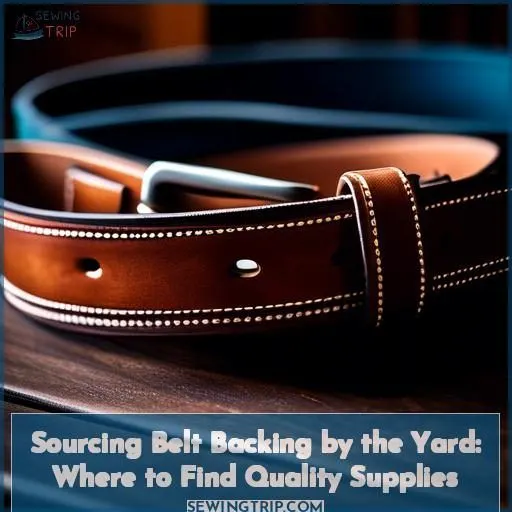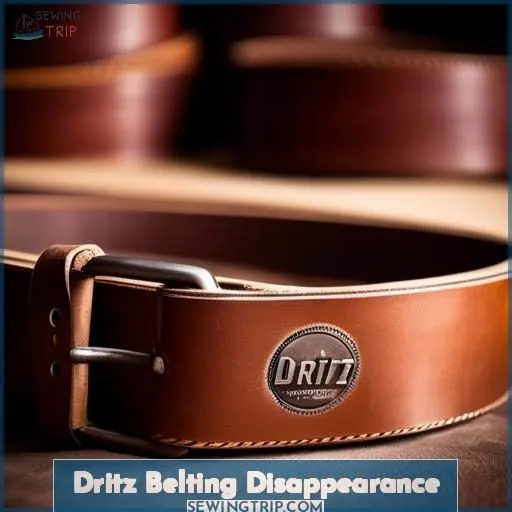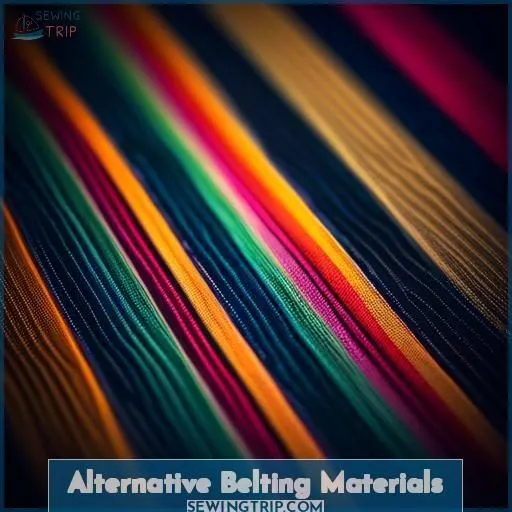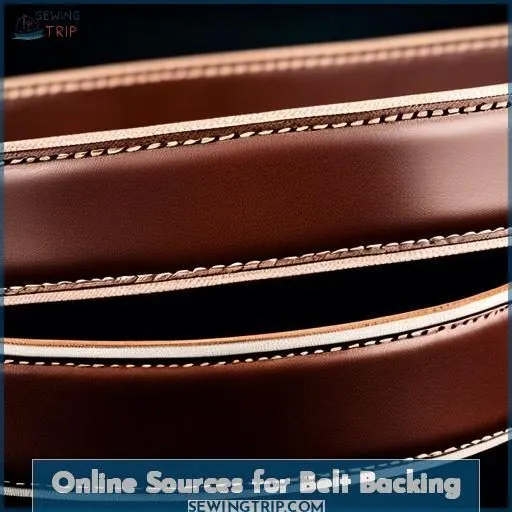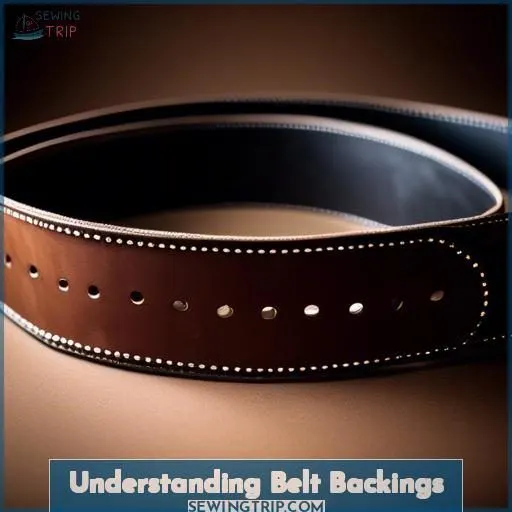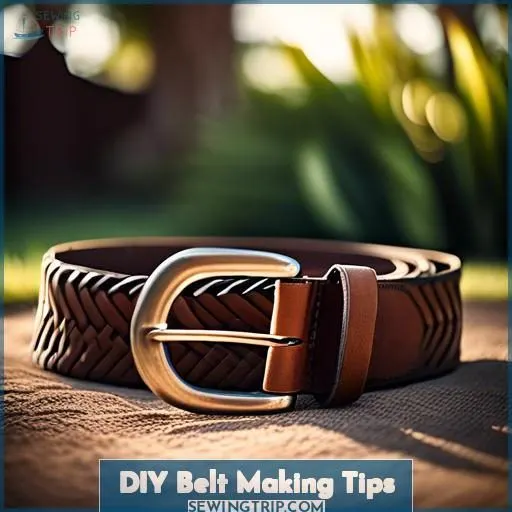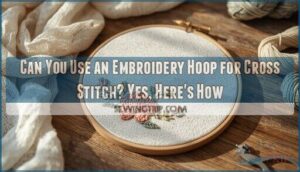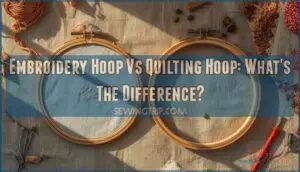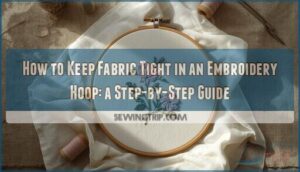This site is supported by our readers. We may earn a commission, at no cost to you, if you purchase through links.
You’ll find an extensive range of superior belt backing materials available by the yard from reliable online fabric providers like The Sewing Place and Country Store Fabrics.
These sources provide cloth-covered plastic belt backing, BanRol, and Buckram, guaranteeing access to the ideal base for creating robust, top-notch belts customized to your precise requirements.
Investigate abrasive belt backings made from rayon, cotton, and polyesters in different weights intended for specific applications like light grinding with Y-weight or heavy-duty sanding with HH-weight cloth.
Understanding the intricacies of these materials unlocks artistic possibilities in your projects.
Table Of Contents
Key Takeaways
- Online fabric providers like The Sewing Place and Country Store Fabrics offer a wide range of superior belt backing materials, including cloth-covered plastic belt backing, Banol, and Buckram.
- Alternative materials such as cotton woven webbing can be used for self-fabric belts when Dritz belting is not available.
- Cloth-covered plastic belt backing, Banol, and Buckram can serve as suitable alternatives for creating self-fabric belts.
- The Sewing Place and Country Store Fabrics are reliable online sources for purchasing belt backing by the yard, offering a variety of materials suitable for creating sturdy, professional-grade belts.
Where to Buy Belt Backing by the Yard?
You can purchase belt backing by the yard from various suppliers.
One option is Thomasnet, which offers custom-manufactured belt backing with capabilities including fabrication, conveyor profiling, welding, splicing, serrating, grinding, and perforating.
Another option is Countrystorefabrics, which provides cloth-covered plastic belt backing cut per yard.
CoverButtons.com offers a range of belt backing options, including BB-100 -1 Belt Backing and BB-200 – 2 Belt Backing, with prices starting at $4.95.
WeSewRetro provides a Belt Backing Kit with 1.5 Belting and Eyelets.
GAN offers a white cardboard-like belt backing by the yard or the 24-yard roll.
Alibaba.com is a global online marketplace where you can find various belt backing materials for wholesale.
Amazon.com offers a variety of belting for sewing, including 1” Off White Belting Ribbon Permafused Backing, 1.5 Heavyweight Webbing Strap, and Heavy Cotton Webbing 1 Inch 12 Yard.
Dritz Belting Disappearance
You’ve noticed the disappearance of Dritz belting from stores and online suppliers, leaving you in a bind for your sewing projects and belt making. While Dritz belting has been a staple for 20 years, its absence has created a need for alternative materials.
Look into cotton woven webbing, which can be used for self-fabric belts. For more specialized applications, consider materials like cloth-covered plastic belt backing, BanRol, or Buckram.
As you explore sourcing options, keep in mind the specific requirements of your project, such as the type of grinder or the material you’re working with, whether it’s specialty rubber or wood-based products.
Alternative Belting Materials
If the disappearance of Dritz belting has impacted your projects, you’re in luck. Cloth covered plastic belt backing, BanRol, and Buckram can all serve as suitable alternatives for creating self-fabric belts. These materials offer similar properties and functionality to the discontinued Dritz belting.
Cloth Covered Plastic Belt Backing
If you’re looking for an alternative to Dritz belting, consider cloth-covered plastic belt backing.
This material offers a combination of fabrication techniques and resilience that can transform your projects.
With a wide range of sourcing options, you can discover the ideal backing for your self-made belts.
Design inspiration and project ideas are abundant, allowing you to express your ingenuity.
Whether you favor polyester or prefer other materials, there’s a backing that aligns with your requirements.
BanRol and Buckram
When sourcing belt backing alternatives, you may come across BanRol and Buckram. These materials can be found at various suppliers and are suitable for a wide range of applications. Here are three key points about BanRol and Buckram:
- BanRol: BanRol is a type of fabric that’s often used as a backing material for belts. It’s a lightweight, flexible material that can be easily cut and shaped. BanRol is known for its strength and durability, making it a popular choice for belting applications.
- Buckram: Buckram is a woven fabric that’s typically made from cotton or linen fibers and impregnated with a stiffening agent, such as starch or resin. It’s known for its rigidity, strength, and ability to hold its shape. Buckram is often used in bookbinding, millinery, and garment-making due to its unique properties.
- Suppliers: You can find BanRol and Buckram at various suppliers, both online and in-store. Some popular options include The Sewing Place and Country Store Fabrics. These suppliers offer a wide range of belt backing materials, including BanRol and Buckram, to cater to different needs and applications.
When selecting the right belt backing material, consider factors such as the width of the belt, the weight of the material, and the specific requirements of your project. Both BanRol and Buckram offer unique properties that can be beneficial for various belt applications.
Online Sources for Belt Backing
You’ll find that The Sewing Place and Country Store Fabrics are reliable online sources for purchasing belt backing by the yard. These retailers offer a range of materials suitable for creating sturdy, professional-grade belts, including cloth-covered plastic belt backing, BanRol, and buckram.
The Sewing Place
The Sewing Place offers a variety of belt backings suitable for your needs.
If you’re looking for alternatives to Dritz belting, consider their cloth-covered plastic belt backing.
They also stock BanRol and Buckram, perfect for creating substantial self-fabric belts.
For those seeking belt backing by the yard, The Sewing Place has you covered.
Their casual slide belt and maxant single-belt packs are popular choices among sewists.
Don’t miss out on their tutorials and guides to help you select the right belt backing for your project.
Country Store Fabrics
If you’re on the hunt for belt backing materials, Country Store Fabrics is a great online source to explore. Here are four key aspects that make it a valuable destination for your fabric needs:
- Fabric Availability: Country Store Fabrics offers a wide range of fabric options, ensuring you have plenty of choices for your belt backing material.
- Pattern Selection: Their inventory includes various patterns, allowing you to select the perfect match for your project.
- Fabric Weight: They cater to different fabric weights, enabling you to find the right backing material for your specific belt.
- Styling Options: With a variety of styling options available, you can choose the look that best suits your project and personal taste.
Additionally, Country Store Fabrics offers other fabric-related products like elastic belting, belt hooks and eyes, web belting, and belt hooks & eyes. This makes it a one-stop-shop for all your belt-making needs.
Understanding Belt Backings
You’ll want to be familiar with the different types of abrasive belt backings used in industrial applications. Typically made from materials like rayon, cotton, polyesters, blends, or heavy paper, these backings have varying weights and tensile strengths designed for specific purposes – from light grinding on metal or wood products to heavy-duty sanding of warped lumber at high speeds.
Abrasive Belt Backings
Having explored the realm of online belt backing options, let’s delve into the finer points of abrasive belt backings.
Imagine this: you’re working with plastic laminate, seeking to enhance its finish or smooth out rough lumber.
Your selection of abrasive grain is paramount.
Choose a Y-weight cloth backing for resilience or an HH-weight for demanding material removal tasks.
Bear in mind, the appropriate backing transforms a dry application into an artistic masterpiece.
Types of Abrasive Belt Backings
Delving into the world of abrasive belt backings, you’ll discover a diverse array of materials and weights tailored to various applications.
Rayon, cotton, polyesters, blends, and heavy paper are prevalent backing materials.
Each has distinct weight classifications – X-Weight, Y-Weight, H-Weight, and HH-Weight.
These classifications represent the weight per square yard, with Y-Weight being the most widely used.
Abrasive grains such as aluminum oxide, silicon carbide, zirconia alumina, and ceramic are employed in wide belt applications.
The grain type selection is contingent upon the specific application.
Whether you’re operating a single head grinder, refinishing circular sawn lumber, or embarking on DIY endeavors, comprehending the compatibility of these backings is essential for achieving desirable outcomes.
DIY Belt Making Tips
If you seek to craft your own belts, it’s essential to select the appropriate belt backing material. Refer to online tutorials and guides to ascertain the suitable backing weight, composition, and attributes for your project’s intended purpose and desired suppleness or firmness.
Tutorials and Guides
Tutorials and Guides (DIY Belt Making Tips)
For those beginning a DIY belt-making expedition, there are numerous tutorials and guides available to assist you. Here are three resources to investigate:
- Sewing Machine Operation
- Learn how to operate your sewing machine for belt-making, including tips on threading and tension adjustments.
- Belt Width Alternatives
- Discover the various width alternatives available for your belt project, from narrow to wide, and how to select the appropriate one.
- Fabric Belting Techniques
- Explore different techniques for working with fabric belting, such as folding, stitching, and attaching backing materials.
Selecting the Right Belt Backing
When selecting the right belt backing for your DIY project, consider the characteristics of the material.
For instance, HH-Weight cloth backings are ideal for rough lumber sanding.
While Y-Weight and H-Weight cloth backings are suitable for metal grinding or polishing.
Always check the thickness, yardage, and availability of the backing material from your chosen supplier.
Especially when dealing with high stock removal rates, band sawn lumber after kiln drying, or warped lumber with loose knots.
Frequently Asked Questions (FAQs)
Can I buy belt backing in rolls?
Sure, you can cast your line into the wide belt backing pond and reel in rolls to your heart’s content. These tough-as-nails backings, whether rayon or cotton-blended, come spooled for your convenience and custom projects.
What is the weight difference between X and Y weight backing?
Y-weight’s around 8 oz per sq yard, while X-weight’s lighter at 6 oz. That extra reinforcement in the Y lets it tackle tougher jobs without batting an eye. For real beasts, you’ll want the heftier H or HH weights though.
Can I use heavy paper backing for heavy duty applications?
Ever wondered if that heavy-duty paper could tackle the toughest jobs? You can’t – it’s not designed for high stock removal, moderate shock loads, or equipment wear and tear. For those rugged applications, you need the tensile strength and durability of cloth-backed wide belts.
How do I choose the right abrasive grain for my project?
You’ll want to match the abrasive grain to your project’s needs. Aluminum oxide cuts aggressively for heavy stock removal, while zirconia‘s tougher for precision finishing. Ceramic blends offer a nice balance – it’s like having a team of grains perfectly suited for any task.
Are there any discounts for bulk purchases of belt backing?
Imagine a sea of discounts awaits, my friend! Bulk purchases often unlock deep discounts, so you can build an empire of belting without breaking the bank. But like any conquest, negotiation is key – haggle away for the best deal!
Conclusion
Imagine turning a plain strip of belt backing into a distinctive, durable accessory that enhances your outfit.
With premium materials such as cloth-covered plastic, BanRol, and Buckram readily available from reputable online suppliers like The Sewing Place and Country Store Fabrics, where you can find belt backing by the yard, you have the resources to create flawless belts that meet your requirements.
Seize this opportunity to showcase your creativity through carefully crafted, enduring accessories.

